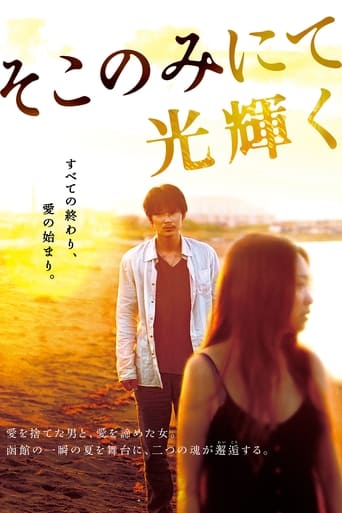nmegahey
There are a few convenient encounters in Mipo O's The Light Shines Only There, but moored to a stark realism, an unconventional narrative approach and characterisation that is far from typical, it just has a way of making those narrative twists even more unsettling. Set in Hakodate in the remote north island of Hokkaido, Tatsuo has turned to heavy drinking and gambling as a means of blocking out a terrible event in his previous employment as a quarry miner. An encounter with the sister of Takuji, a guy he meets in a pachinko parlour, could however save Tatsuo from oblivion. Chinatsu's family affairs, her job at a squid factory, her love life and her ways of earning some extra money are hardly ideal, but such is In Tatsuo's position that you suspect he would willingly sacrifice illusions for some semblance of normality. Some people's realities however might be too hard for anyone to live with. If there are some characteristics that remind one of a Kinji Fukasaku wild youth movie, with even a slight gangster spin towards the conclusion, Mipo O's film applies real people to dramatic situations and shows the often brutal nature of life in the remotest regions of Japan.
GyatsoLa
I caught this film at the recent Japanese Film Festival in Dublin - although not intentional, it is in many ways very similar to the last Asian film I've seen at a festival - the Korean film 'A Girl at My door' (Dohee-ya) - both films following the lives of somewhat wounded people stranded in small, fading rural towns, both films by young female directors, and both with a somewhat arbitrary sprinkling of sexual dysfunction to add a bit of perversity to otherwise straightforward dramas. The film first focuses on Tatsuo, who seems to be drifting randomly through life, uninterested in anything but Pachinko and drinking. We learn quickly he seems to be suffering some form of PTMS after witnessing a friend dying in an accident at the quarry he works. He is drawn reluctantly into the life of somewhat dim-witted but cheerful and extrovert Tajuki, who lives in poverty with his mother, stroke crippled father, and sister, Chinatsu. Inevitably, Chinatsu and Tatsuo exchange meaningful glances, but seem unable to convert this attraction into actual conversation.Chinatsu, it emerges, is a part time prostitute and occasional lover of a local corrupt businessman, and if not quite as traumatized as Tatsuo, seems beaten down by life and seems to have largely given up hope of a life for herself. She immediately dumps her businessman lover as she senses something about Tatsuo that gives her some hope.The film is largely a character study of these broken characters, focusing on their lives. The story does stray into somewhat more perverse territory in what seems an unnecessary attempt to make it stand out - I don't think a subplot about the stricken fathers sexual priapism adds much to the film. After what seems a conventional happy ending, the film then gears up into more melodramatic territory, with a suitably ambiguous (and beautifully shot) ending.At times I thought the film lacked the courage of its own convictions, relying on shock tactics rather than having faith in the integrity of the characters and how much the viewer cares about them. The three leads are very good and attractive, and quite believable characters. Some of the lesser parts though are not so well acted or written. I did find it gripping, and quite moving at the end - definitely a promising step up for the film makers - I'll certainly be looking out for her next film.
Red_Identity
This is a really elegantly made film all around. Of course, it's grim but the colors and the cinematography do a good job of highlighting just the right type of tone needed for the narrative and these characters' journeys. And emotional journeys they do take. The actors are really fantastic though, and really do make it a powerful sort of journey, much more effective than I would've thought as how the film started. I do think it's such an uncomfortable viewing experience though, not an easy one and while I can usually handle that, I don't think this is a great film though. Effective, but certain writing issues keep it from getting on another level. Still, recommended.
Mozjoukine
A change of pace from her earlier films, Mipo Oh's murky and perverse film was put up as a Japanese Oscar entry, so someone must have taken it seriously.Ayano is working through his personal fortune in his twenties (open cut mining back story) when he lends his briquette to loud pinchuko player youth Suda, who invites him back to a home that's as grubby as Ayano's own. He shares it with his infirm sex addict dad, exhausted mother and earthy sister Ikewaki, who we know is going to be important because they play single piano notes under her shot. A few attention getting moments. The embrace in the sea is one but the frequent shadowed make-out material is too indistinct to have voyeur interest.The cast are strong and the Hokaido background is unfamiliar but the story and brown out imagery are both tacky.



